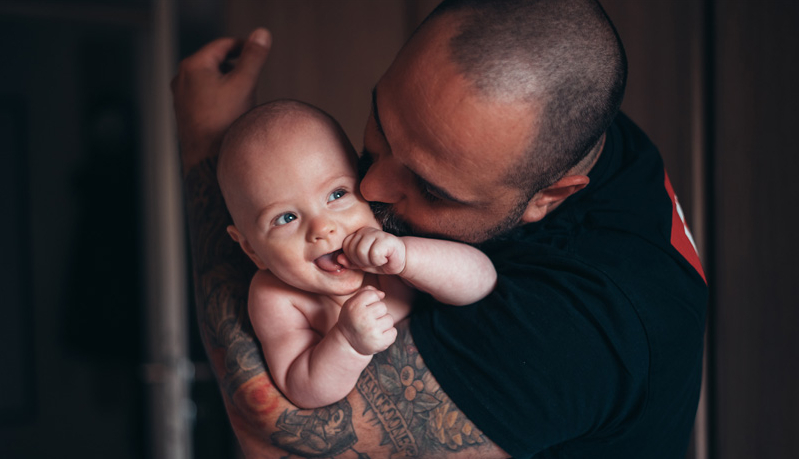
On my first Father’s Day after my son was born, I didn’t feel like a dad. He came into the world when I was in prison, and I had only met him through glass. He was there, he was alive, he was somehow mine—but I didn’t feel a rush of responsibility or some new cloak of fatherhood settling over me. The truth was, I had no idea what it meant to be a father.
Nearly half of all men in United States' state prisons are fathers.
I wasn’t alone. Nearly half of all men in United States' state prisons are fathers. Many of these men, like me, struggle to know how to fill that role. This lack of knowledge can perpetuate harmful cycles and lead to generational damage. Research shows that children with incarcerated fathers are at greater risk of ending up homeless, facing mental health challenges and becoming involved in the criminal justice system themselves.
The need is clear, and the Church can play a major role in helping these fathers grow into men who can give their children a better future.
Fatherhood isn’t just a title, it’s an identity I simply didn’t possess. My personal experience was limited to the dysfunctional family relationships I had grown up with. I didn’t know what it meant to love and lead my son. I needed a completely different perspective on fatherhood.
Realizing that someone else is depending on you—without any real understanding of all this entails—is a big adjustment that’s hard to make alone. But making this shift can be a key path toward building a better life. With the right support and education, fatherhood can be a responsibility that marks a turning point. But we can’t expect incarcerated fathers to do it by themselves.
Many incarcerated fathers have likely never seen an example of a good father.
There’s no mystery or debate around the importance of fathers in breaking harmful, generational cycles. Many incarcerated fathers have likely never seen an example of a good father and feel like I did: unequipped to do anything other than what we’ve known our whole lives.
Without intervention, my children would have paid the price for my ignorance. Changing the story for fathers and children starts with showing men what healthy fatherhood looks like.
Thankfully, that’s what someone did for me. After I was released, I lived with a family from my church for two years, and it changed my life. In their home, I watched a father hug his son. For the first time in my life, I watched a family sit around the dinner table. And, as I watched a father sacrificially love his wife and children, my understanding of fatherhood started to shift.
Every night, this man who had become my spiritual father turned a lamp on for me in my basement room. When I came home and saw that light, I was reminded of the selflessness and intentionality of a good father.
What changed my understanding of fatherhood wasn’t a pamphlet or a lecture; it was the consistent example of a dad who loved his family like Christ loves us. His witness broke down my old, flawed ideas of fatherhood and transformed my relationship with my heavenly Father as well.
The Church is called to be a living witness to the Father’s love.
My story shouldn’t be rare. The Church is called to be a living witness to the Father’s love before a watching world, and currently and formerly incarcerated fathers desperately need that witness. The Scriptures are clear that we are to love those society often overlooks: to care for the sick, clothe the naked, and visit those in prison. That’s not a call for another time or a different group of people. It’s a call for us today.
The need is all around us. One in every three Americans has a criminal record, so there’s likely someone like me at your church. He or she needs Christians to walk alongside them. Across our nation, more than a million children have an incarcerated father. These men (and their families) need the Church to take action.
Even small acts of faithfulness can change the lives of our neighbors who don’t know what it means to be a healthy father. Whether it’s volunteering at a local prison ministry, helping families maintain connection with their incarcerated loved ones or inviting them into your home for a meal, there are many powerful, tangible ways to live out the gospel. By seeking out relationships with currently and previously incarcerated dads, the Church can give them tools to change their lives and lead their families.
Today, when I hug my son or sit around the dinner table with my family, I’m reminded of the lessons I learned because someone cared enough to come alongside me.
When the Church shows fathers what Christ’s love looks like, they discover a new identity and their children gain a more stable future.
Sammy Perez serves Prison Fellowship’s Advocacy team by building and mobilizing a network of people passionate about justice that restores. Perez equips Prison Fellowship’s Justice Advocates and Justice Ambassadors in the U.S. to raise awareness about criminal justice reform and improve the criminal justice system through strategies including digital advocacy, constituent lobbying, media engagement, and storytelling. Sammy graduated from Liberty University with a degree in psychology, specializing in addiction and recovery, and a master's degree in professional counseling. His expertise is focused on organizing and coaching Christians to pursue justice and reentry for people returning from prison.
News Source : https://www.christiandaily.com/news/helpful-insight-into-how-churches-can-help-incarcerated-fathers-to-succeed
 Your post is being uploaded. Please don't close or refresh the page.
Your post is being uploaded. Please don't close or refresh the page.





